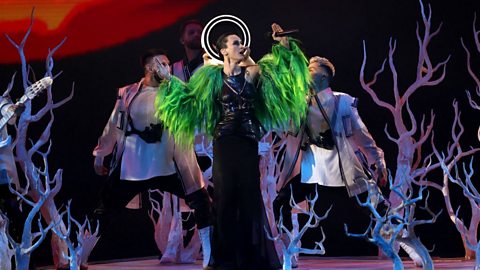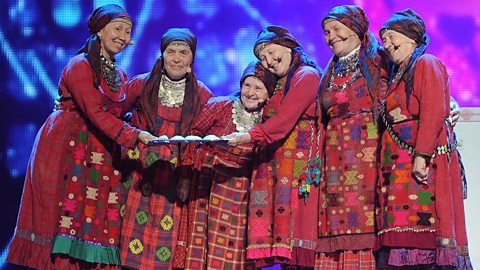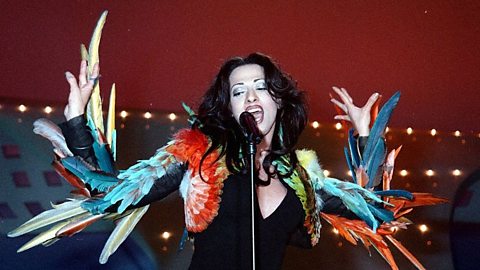Grab your popcorn and scoreboards and get ready to bop to the best songs Europe (and friends) has to offer. But, before we start, it's important that you know the answer to this important Eurovision question…
When did the Eurovision song contest start?
The Eurovision Song Contest (ESC) has captured imaginations in living rooms around Europe since 1956 and now brings in more than 160 million viewers. Whether it’s your first watch or you’re a seasoned fan, you can never know enough Eurovision trivia.
Now you know how long the Eurovision has been around, you're ready to begin our fact-packed guide to bolster your Eurovision knowledge bank.
7 fun facts about the Eurovision Song Contest
1. What Eurovision curses are there?
There are many cautionary folk tales which have arisen out of Eurovision, including superstitions about why things go wrong. One of these is the Curse of Green: seemingly year after year, acts which have green-lit staging or the main performer in green garb tend to not do well, or fail to qualify for the final.
However, Katrina and the Waves won the Eurovision for the UK in 1997 when singer Katrina Leskanich wore a green shirt for “good luck” on the Dublin stage. This started as an ill twist of fate as Katrina got it second-hand and wore it after they couldn’t find another outfit for the performance. Pairing the shirt with a blazer that only had one shoulder pad, the winning song Love Shine a Light peaked in the UK charts at number three - so perhaps if it’s Irish green you’re okay.

2. Ukraine is a very successful Eurovision nation
You probably know that while Eurovision 2023 was hosted in Liverpool, it was on behalf of 2022’s winner Ukraine - a country that has a few special facts to boast all to itself. One of the most successful countries in the competition, Ukraine was the first Eastern European country to gain two victories, first in 2004 and then again in 2016, and 2021's entry SHUM by Go_A was the first time an entry was sung in all Ukrainian. But perhaps the most impressive thing is it’s also the only country that's qualified for the Grand Final every single year it’s competed.
3. Which country has won Eurovision the most times?
The two most successful countries in Eurovision so far are Ireland and Sweden with a whopping seven wins between them. The country that’s entered the most times with the least wins is Cyprus, who are yet to take it home. However, Norway and Austria are equal with the most zeroes scored, finishing with the dreaded nul points four times each. In 2015, the Eurovision Song Contest was recognised by the Guinness Book of World Records as the Longest Running Annual TV Music Competition, and has only ever been cancelled once - in 2020, due to COVID-19.
4. When Eurovision ends in a draw
While the ESC has taken place 67 times, there have been 70 winners thanks to a tie between the UK, Spain, the Netherlands and France in 1969 in the Spanish capital of Madrid. This was unprecedented then, and so tiebreaker rules were introduced the following year following a bit of grumbling and even some countries pulling out in protest. This was the second win for both Spain and the UK, and, to top off the uniqueness of this year, promotional material for the contest was designed by surrealist artist Salvador DalГ.
Only one other ESC resulted in a tie (1991) between France and Sweden, and the rule to decide then was whoever had the most sets of 12 points. They both had four, so it moved down to the most sets of 10 points, and Sweden snatched the victory.

5. Why is Australia in the Eurovision Song Contest?
Australia was invited to compete as a gesture of goodwill at Eurovision 2015 for the contest’s 60th anniversary. The country had been a loyal viewer with high broadcast ratings for over 30 years. While it was meant to be a one-off, Australia stayed put and has finished in the Top Ten five times.
It’s not the first non-European country to compete - Israel is a regular contender - as to be eligible a country must be an active member of the EBU (Eurovision Broadcasting Union), and so the competition has never been strictly geographical. Other countries that tune in regularly are the USA, Japan, and China, though it’s unknown if they’ll be asked to compete any time soon.
6. Here's who won Eurovision by singing barefoot
Here’s an icebreaker for the ESC party - there have been five barefoot winners on the Eurovision stage: Sandie Shaw, UK (1967), Sertab Erener, Turkey (2003), Dima Bilan, Russia (2008), Loreen, Sweden (2012) and Emmelie De Forest, Denmark (2013). Sometimes it takes a good pedicure to boot the competition!

7. The countries that competed in the very first Contest - there was no UK!
It might surprise you to know that the very first ESC only had a total of seven competing countries, especially when it’s so big now that it’s been broadcast on five of the seven continents! Swizerland hosted in Lugano, and competed with Belgium, France, Italy, Luxembourg, the Netherlands and west Germany. They competed with two songs each and Swizerland took the victory. It was primarily a radio show, with no on-screen voting, though some people in Europe could enjoy it on early televisions but wouldn’t see where each country placed. Since then it’s grown into the extravaganza we know and love with a total of 52 countries competing.
So, there you have it, seven Eurovision fact nuggets to keep you ahead of the crowd! Will you be watching Eurovision 2024? Head over to iPlayer and get yourself comfortable.
Still haven't had your fill of ESC trivia? Learn more about the big event here.
This article was published in May 2023 and updated in May 2024
Can you take on the Eurovision big numbers quiz?
How well do you know the facts and figures of Eurovision? Take the quiz to find out!

How Eurovision shines a light on languages
From Russian entries in Udmurt to French songs in Breton - and more

Five of Eurovision's most unforgettable acts
The performers who made a musical and cultural impact at the song contest.
